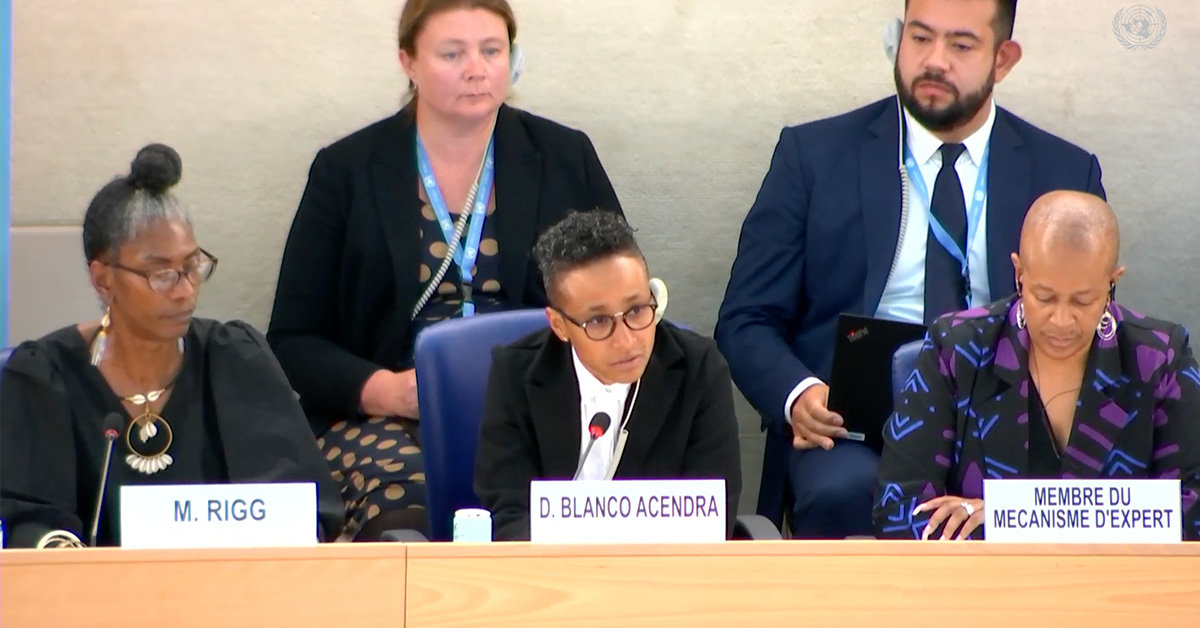On 5 October, Council member States met with the High Commissioner on Human Rights and the members of the Expert Mechanism to Advance Racial Justice and Equality in the context of Law Enforcement (EMLER) to discuss two reports on violence in policing: one from the mechanism and the other from the Office of the High Commissioner (OHCHR).
The EMLER report compiled the mechanism’s activities since October 2022 – including its visits to the United States and Sweden. It also offered recommendations aimed at ‘reimagining policing’ to address the systemic causes of racially-motivated violence by law enforcement officials, looking at cases of violence against persons of African descent and practices documented in Spain, France, the United Kingdom, Argentina, Brazil, Chile, Colombia and the US.
Experts urged States to look beyond the theory of ‘bad apples’ and recognise that officials ‘will share and reproduce the values, attitudes and stereotypes of the society and institutions in which they live and work’. States should instead examine law enforcement policies with a focus on historical and transitional justice, experts wrote, suggesting that truth and reparation commissions as well as reparation schemes could support this work.
In a bid to help regain trust for enforcement institutions among African and Afro-Descendant communities, EMLER experts expressed their support for ‘community policing strategies’, where community members would be closely associated in the work of identifying needs and methods to ensure safety in their areas.
Experts also urged governments to put in place ‘effective accountability frameworks’ for enforcement officials, calling for ‘credible and transparent investigations and prosecution’ when authorities have to tackle instances of violence where race played a central role.
Echoing various concerns expressed by EMLER members, the OHCHR report also called for increased and ‘effective participation of people of African descent’ in public life in order to counter the ‘pervasive, harmful and degrading racial stereotypes, prejudice and bias’ that feed systemic racism and its manifestations in law enforcement.
Both reports also highlighted the killings of human right defenders of African descent as a growing concern. The UN Antiracism Coalition also commends OHCHR for its work in ensuring that France, the US, the UK, Colombia and Brazil continue to provide updates on the seven emblematic cases of George Floyd, Breonna Taylor, Joao Pedro Matos Pinto, Luana Barbosa dos Reis Santos, Janner (Hanner) Garcia Palomino, Adama Traoré and Kevin Clarke.
Deputy High Commissioner for Human Rights Nada Al-Nashif opened the interactive dialogue calling on States to ‘dismantle systemic racism’. In their remarks, EMLER member Dr. Tracie Keesee, and representatives of victims and affected communities Dayana Blanco and Marcia Rigg reiterated calls for law enforcement reform.
Dr. Tracie Keesee repeated EMLER’s call for a ‘human rights-based approach to policing’, urging States to address the ‘legacies of enslavement’ in their adoption of alternative methods for law enforcement.
Dayana Blanco, director of the Colombian organisation of Afro-descendant lawyers Ilex Acción Jurídica, called on her government to agree to a visit by EMLER experts. She urged them to ensure the ‘inclusive and safe participation’ of Black and Afro-descendant groups in the current discussions on policing reform.
British anti-discrimination campaigner Marcia Rigg, whose brother, Sean Rigg, died in police custody in 2008, spoke of the ‘never-ending trauma’ that families like hers endure when seeking police accountability. In the case of her brother, all officers involved walked away unpunished. Rigg also denounced a ‘lack of confidence’ in public policies aimed at tackling racial discrimination and a ‘lack of willingness’ to enforce these.
The EMLER report comes after a year of momentous activity for its expert members, with two widely publicised visits to Sweden (November 2022) and the US (April 2023), and ahead of a planned visit to Brazil, in November. The mechanism was granted a three-year mandate by a Human Rights Council resolution passed in 2021, which will be up for renewal next year.




